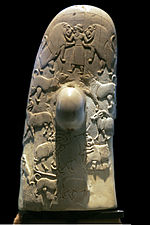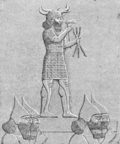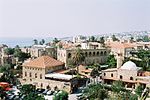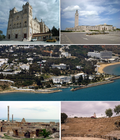Sanchuniathon (/ˌsæŋkjʊˈnaɪəθɒn/; Ancient Greek: Σαγχουνιάθων or Σαγχωνιάθων Sankho(u)niáthōn; probably from Phoenician: 𐤎𐤊𐤍𐤉𐤕𐤍, romanized: *Saḵūnyatān...
18 KB (2,207 words) - 14:41, 26 November 2024
chiefly known for his Phoenician history assembled from the writings of Sanchuniathon. Philo was born in the 1st century in Byblos in what is now Lebanon...
6 KB (742 words) - 12:18, 5 December 2024
ancient Greek mythology, and one in the Phoenician religion described by Sanchuniathon. Dione is translated as "Goddess", and given the same etymological derivation...
6 KB (752 words) - 09:13, 29 October 2024
Philo of Byblos's Greek translation of the writings of the Phoenician Sanchuniathon. In Ugaritic myth, Mot (spelled mt) is a personification of death. The...
12 KB (1,326 words) - 19:05, 2 January 2025
Elyon (section Sanchuniathon)
In Eusebius' account of Philo of Byblos (c. 64–141 CE) record of Sanchuniathon's euhemeristic account of the Phoenician deities, Elioun, whom he calls...
14 KB (1,790 words) - 03:30, 14 January 2025
Phoenician writer Sanchuniathon, was the son of Misor and the inventor of writing, who was bequeathed the land of Egypt by Cronus. Sanchuniathon's writings, through...
1 KB (195 words) - 06:55, 12 November 2023
El (deity) (section Sanchuniathon)
Asherah), and Dione (identified by Sanchuniathon with Ba'alat Gebal the tutelary goddess of Byblos, a city which Sanchuniathon says that El founded). El is...
54 KB (6,564 words) - 15:16, 10 January 2025
as brt (𐎁𐎗𐎚), in connection with Baʿal, and perhaps as Beruth in Sanchuniathon's work. Judges is the only Biblical book that mentions Baʿal Berith and...
7 KB (834 words) - 20:08, 20 October 2024
Eusebius in his Praeparatio evangelica and attributed to the still earlier Sanchuniathon. Philo of Byblos gave the Greek meaning of the name as Δίκαιον "Righteousness"...
4 KB (484 words) - 15:14, 5 January 2025
king to a king of the Ahhiyawa Wu Ding, king of the Shang dynasty. Sanchuniathon, Phoenician writer, is born (approximate date). S.M. Stirling's Nantucket...
2 KB (202 words) - 17:55, 18 July 2024
Tehom (section Sanchuniathon)
demonstrate the equation of the goddess Berouth in the mythology of Sanchuniathon with Ugaritic thmt and Akkadian Tiâmat, as the sea was called tihamatum...
5 KB (473 words) - 07:02, 9 November 2024
Hadad (section Sanchuniathon)
Shamem (Lord of the Heavens), a title most often applied to Hadad. In Sanchuniathon's account Hadad is once called Adodos, but is mostly named Demarûs. This...
26 KB (3,271 words) - 22:55, 5 January 2025
a deity separate to Bel/Marduk. Similarly, Zeus Belus mentioned by Sanchuniathon as born to Cronus/El in Peraea is unlikely to be Marduk. Early translators...
6 KB (534 words) - 22:42, 30 October 2024
other near-eastern histories, such as that of the Phoenician historian Sanchuniathon; but he is considered semi-legendary and writings attributed to him...
164 KB (19,991 words) - 20:35, 12 January 2025
Atlas that had been translated from the works of ancient Phoenician Sanchuniathon, the original sources for which predate the Trojan War (i.e. 13th century...
34 KB (3,199 words) - 12:22, 6 January 2025
and the goddess Taratha[Astarte] and Gadlat." [citation needed] In Sanchuniathon's main mythology the god he calls in Greek 'Uranus'/'Sky' has been thought...
7 KB (910 words) - 15:23, 24 December 2024
Syrian Goddess, 2nd century CE), fragments of the Phoenician History of Sanchuniathon as preserved by Philo of Byblos (c. 64 – 141 CE), and the writings of...
18 KB (2,030 words) - 02:18, 29 December 2024
Jehovah.": 199–200 (2nd century) Ιευώ (Ievō): Eusebius, who says that Sanchuniathon received the records of the Jews from Hierombalus, priest of the god...
92 KB (10,114 words) - 17:29, 29 December 2024
Fragments attributed to the semi-legendary pre-Homeric Phoenician priest Sanchuniathon say Byblos was the first city erected in Phoenicia and was established...
47 KB (4,727 words) - 02:20, 15 January 2025
Byblos whose source was the Phoenician writings of Sanchuniathon. Some doubt the existence of Sanchuniathon. Cf., Attridge & Oden, Philo of Byblos (1981);...
112 KB (14,513 words) - 02:12, 27 December 2024
literary nature (e.g. historical tales, poems, etc.), coins, fragments of Sanchuniathon's History and Mago's Treaty, the Greek translation of the voyage of Hanno...
21 KB (2,068 words) - 18:48, 6 September 2024
or the children of El, supposedly obtained by Philo of Byblos from Sanchuniathon of Berythus (Beirut) the creator was known as Elion, who was the father...
40 KB (4,675 words) - 00:30, 30 December 2024
Christian Eusebius of Caesarea to the semi-legendary Phoenician historian Sanchuniathon, which Eusebius thought had been written before the Trojan War, make...
124 KB (13,054 words) - 12:03, 6 January 2025
acropolium of Carthage. According to Eusebius of Caesarea, Phoenician author Sanchuniathon wrote that Sydyk, 'The Righteous', first fathered seven sons equated...
7 KB (794 words) - 02:38, 23 November 2024
who was afterwards called Phoinix". Quoting fragments attributed to Sanchuniathon, he relates that Byblos, Berytus and Tyre were among the first cities...
129 KB (14,829 words) - 04:11, 12 January 2025
Hierombalus was a priest of Ieuo, mentioned in Sanchuniathon's mythistory, known only through later historian Philo of Byblos via early Christian writer...
3 KB (363 words) - 13:31, 2 January 2025
and Genea whose children allegedly discovered fire, as recorded by Sanchuniathon (Sankunyaton). The 1350-1335 BC Amarna Letters correspondence refers...
4 KB (619 words) - 02:29, 22 November 2024
Eusebius in Praeparatio Evangelica, and attributed to the still earlier Sanchuniathon. He was one of two children of the deities Amunos and Magos. The other...
2 KB (224 words) - 23:21, 13 January 2024
10.34, attributing this view to the semi-legendary Phoenician author Sanchuniathon via Philo of Byblos. In addition to asserting that Muth was equivalent...
126 KB (17,184 words) - 12:09, 5 January 2025
Eusebius to the semi-legendary pre-Trojan War Phoenician historian Sanchuniathon, indicates that Cronus was originally a Canaanite ruler who founded...
48 KB (5,184 words) - 15:24, 17 January 2025


















